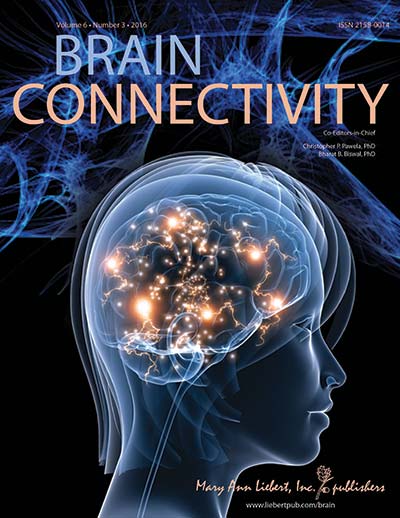For Immediate Release
Reduced Brain Connectivity in Frontal Cortex Linked to Propofol-Induced Loss of Consciousness
Contact: Kathryn Ryan
914-740-2250
kryan@liebertpub.com

New Rochelle, NY, April 14, 2016—A new study shows that loss of responsiveness induced by propofol, a commonly used anesthetic, is associated with greatly diminished brain connectivity in the frontal cortex and significant changes in resting state brain networks. The study, based on a novel method for constructing total brain connectivity maps and comparing them with results obtained for resting state networks, is published in Brain Connectivity, a peer-reviewed journal from Mary Ann Liebert, Inc., publishers. The article is available free on the Brain Connectivity website until May 14, 2016.
In “Propofol-Induced Frontal Cortex Disconnection: A Study of Resting State Networks, Total Brain Connectivity, and Mean BOLD Signal Oscillation Frequencies,” Pieter Guldenmund and coauthors from University of Liège and CHR Hospital Citadelle (Liège, Belgium), National University of Colombia and Central University of Colombia (Bogotá), University of Western Ontario (London, Canada), and University of Wisconsin (Madison), used resting-state functional magnetic resonance imaging (fMRI) to determine changes in resting state brain networks, total brain connectivity, and mean oscillation frequencies of the regional blood oxygenation level dependent (BOLD) signal associated with propofol-induced mild sedation and loss of consciousness. The researchers conclude that diminished connectivity in the frontal lobes plays an important role in propofol-induced loss of responsiveness.
“Very little is understood about the biological mechanism of how an anesthetic produces sedation and loss of consciousness, especially in the brain,” says Christopher Pawela, PhD, Co-Editor-in-Chief of Brain Connectivity and Assistant Professor of Anesthesiology, Medical College of Wisconsin. “Pieter Guldenmund and his colleagues have produced an elegant study using resting-state functional connectivity MRI to implicate the frontal lobes in the mechanism of action of propofol in the brain.”
About the Journal
Brain Connectivity is the essential peer-reviewed journal covering groundbreaking findings in the rapidly advancing field of connectivity research at the systems and network levels. Published 10 times per year online with open access options and in print, the Journal is under the leadership of Founding and Co-Editors-in-Chief Christopher Pawela, PhD, Assistant Professor, Medical College of Wisconsin, and Bharat Biswal, PhD, Chair of Biomedical Engineering, New Jersey Institute of Technology. It includes original peer-reviewed papers, review articles, point-counterpoint discussions on controversies in the field, and a product/technology review section. To ensure that scientific findings are rapidly disseminated, articles are published Instant Online within 72 hours of acceptance, with fully typeset, fast-track publication within 4 weeks. Tables of content and a sample issue may be viewed on the Brain Connectivity website.
Brain Connectivity is the essential peer-reviewed journal covering groundbreaking findings in the rapidly advancing field of connectivity research at the systems and network levels. Published 10 times per year online with open access options and in print, the Journal is under the leadership of Founding and Co-Editors-in-Chief Christopher Pawela, PhD, Assistant Professor, Medical College of Wisconsin, and Bharat Biswal, PhD, Chair of Biomedical Engineering, New Jersey Institute of Technology. It includes original peer-reviewed papers, review articles, point-counterpoint discussions on controversies in the field, and a product/technology review section. To ensure that scientific findings are rapidly disseminated, articles are published Instant Online within 72 hours of acceptance, with fully typeset, fast-track publication within 4 weeks. Tables of content and a sample issue may be viewed on the Brain Connectivity website.
About the Publisher
Mary Ann Liebert, Inc., publishers is a privately held, fully integrated media company known for establishing authoritative medical and biomedical peer-reviewed journals, including Journal of Neurotrauma and Therapeutic Hypothermia and Temperature Management. Its biotechnology trade magazine, GEN (Genetic Engineering & Biotechnology News), was the first in its field and is today the industry’s most widely read publication worldwide. A complete list of the firm’s 80 journals, newsmagazines, and books is available on the Mary Ann Liebert, Inc., publishers website.
Mary Ann Liebert, Inc., publishers is a privately held, fully integrated media company known for establishing authoritative medical and biomedical peer-reviewed journals, including Journal of Neurotrauma and Therapeutic Hypothermia and Temperature Management. Its biotechnology trade magazine, GEN (Genetic Engineering & Biotechnology News), was the first in its field and is today the industry’s most widely read publication worldwide. A complete list of the firm’s 80 journals, newsmagazines, and books is available on the Mary Ann Liebert, Inc., publishers website.